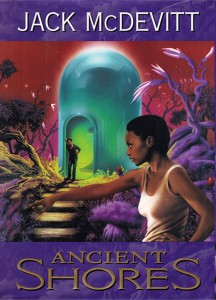With news that the latest novel Thunderbird by Jack McDevitt will be coming out in December, the anticipation is mounting. If not, it should be. The award winning author of the Priscilla Hutchins’ Academy Series and the Alex Benedict series, along with a slew of other notable works, is returning this time to the storyline of one of his most thought provoking stand-alone works.
It’s been nearly twenty years since we were first treated to a book titled Ancient Shores, the fast paced tale of discovery and fear and the social struggles an advanced technology can have on civilization when it is dropped in our laps.

Jim Burns
HarperPrism (imprint of Harper Paperbacks) first published Ancient Shores in 1996. This is the copy I dusted off and decided to reread. It had been way too long, and with the highly anticipated “sequel” Thunderbird coming out from Ace Books (imprint of The Berkley Publishing Group), it seemed like the right thing to do while we wait…patiently.
The original story begins with North Dakota farmer Tom Lasker and his son Will who discover a boat buried deep in their soil. Unearthed from a partial of land that had once been a large body of water, but has been dry for over 10,000 years when, this large yacht shows no signs of aging. Lasker’s friend Matt Collingwood sends a sample of the material to a lab for analysis and is told by the ambitious director April Cannon that the vessel is made of transuranic fiber, an element of artificially created material beyond current scientific capabilities.
Tired of the publicity, the Laskers just want to sell their find and move on, but Matt and April are determined to unlock the mystery behind how this phenomenon could happen. After numerous obstacles and the typical bureaucratic roadblocks, clues lead the pair to the discovery of a glass like “roundhouse” made out of the same material as the boat buried in the ridge of a nearby Sioux reservation. Along with a probable dock for the boat, they also learn that the structure contains a “teleportation” device enabling the user to travel to other worlds. And this is where the real trouble begins.
In true McDevitt style, Ancient Shores is much deeper than just a speculative adventure. The possible social and economical implications of having such advanced technologies dropped in our laps is quite scary. Just like the implementation of robotics, replacing human workers on the assembly lines, the labor force will take an immediate hit. But when you consider the repercussions of a society driven so heavily by time and movement, the economic impact could be even more devastating. We would no longer need cars, planes, or trains. The shipping industry would be obsolete. The control of immigration and national security would be in turmoil as people can just “show up” anywhere at any time. The effects and how such an invention can be controlled is staggering.
Sure this type of technology can eventually be beneficial, but when something so drastic is thrown at us, humanity doesn’t have the time to adjust. Regardless how quickly we’d all like to advance, the slow, methodic pace of the evolution of knowledge is evidently a necessity to maintain civility.
Another fun aspect of the story is McDevitt’s list of characters he chose to represent humanities need to grasp this alien technology. In a final battle against those who opposed the knowledge, the power committee included the likes of paleontologist Stephen Jay Gould, theologian Charles Curran, historian Arthur M. Schlesinger, Jr., astronauts Scott Carpenter and Walter Schirra, astronomer Carl Sagan, physicist Stephen Hawking, astrophysicist David Schramm, fellow astrophysicist and novelist Gregory Benford, another novelist Ursula K. Le Guin, poet Richard Wilbur, fictional poet Walter Asquith and economist Harry Markowitz. If such a discovery happened today, who would YOU chose to represent humanities need for advancement.
I can’t help but wonder if the name Jack McDevitt would end up on that list.
If you haven’t read Ancient Shores yet, you should run out and get a copy today. If you have, you should read it again. It’ll remind you why Jack McDevitt is such a successful writer and maybe even prepare you for his latest novel Thunderbird later this year. December can’t come soon enough.











1 Comment